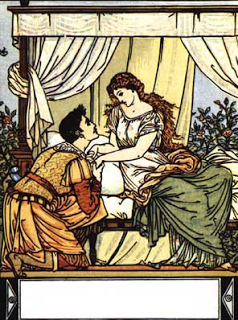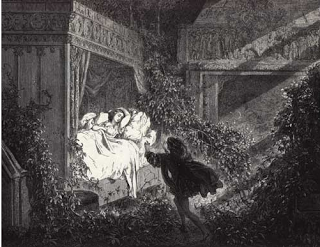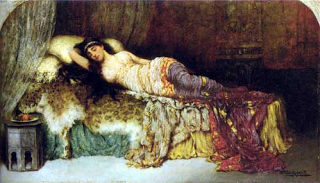For the Love of Fairy Tale Adaptations (Guest Blog)
Today, Jessica Grey returns with a guest blog: For the Love of Fairy Tale Adaptations.
And there's more! Jessica will also be giving away a free copy of her new book, Awake: A Fairytale ! To enter to win a copy, just leave a comment either here or in Jessica's Teatime Ten interview!
For the Love of Fairy Tale AdaptationsGuest Blog by Jessica Grey
"When I was ten, I readfairy tales in secret and would have been ashamed if I had been found doing so.Now that I am fifty, I read them openly. When I became a man I put awaychildish things, including the fear of childishness and the desire to be verygrown up." -C.S. Lewis Illustration by W. CraneFairy tale adaptations are everywhere right now. In the movies, on television, in popularfiction. It's a trend that seems to comearound every decade and a half or so. Asa child I was lucky enough to grow up with Shelley Duvall's Faerie Tale Theaterand a Beauty and the Beast remake on prime time television. As a young reader I was able to read bookslike Beauty and Spindle's End by Robin McKinley. Of course whole generations of children grewup with Disney adaptations, and Disney Animation revived the fairytaletradition in the early 90s. Adaptingfairy tales is nothing new, and I would bet a whole nickel that the writers ofOnce Upon a Time and Grimm probably are close to my age and grew up with manyof those same influences. Fairy taleshave a way of getting into your mind and soul and changing the way you look atthe world and the way you write.
Illustration by W. CraneFairy tale adaptations are everywhere right now. In the movies, on television, in popularfiction. It's a trend that seems to comearound every decade and a half or so. Asa child I was lucky enough to grow up with Shelley Duvall's Faerie Tale Theaterand a Beauty and the Beast remake on prime time television. As a young reader I was able to read bookslike Beauty and Spindle's End by Robin McKinley. Of course whole generations of children grewup with Disney adaptations, and Disney Animation revived the fairytaletradition in the early 90s. Adaptingfairy tales is nothing new, and I would bet a whole nickel that the writers ofOnce Upon a Time and Grimm probably are close to my age and grew up with manyof those same influences. Fairy taleshave a way of getting into your mind and soul and changing the way you look atthe world and the way you write.
My early exposure to fairy tales (we had the most amazingcollection of books when I was a kid) and adaptations has definitely affectednot only the way I write but what I write. My first novel, Awake: A Fairytale, is an adaption of SleepingBeauty. In my story Sleeping Beauty isawakened in modern day Los Angeles by a kiss, but the curse isn't trulybroken. Instead, the sleeping spell transfersto the boy who kissed her. My maincharacter, Alexandra Martin, is a childhood friend of the kisser and is stucktrying to figure out a) how to wake him up, and b) what exactly to do with theawakened twelfth century princess.
There are people that love fairy tale adaptations, but you alsooften hear people saying they prefer the original version of a particulartale. While I am all for authenticity,and for fairy tales and folk stories being read in their earliest writtenforms, the fact is that so many of these stories existed as oral traditionsbefore they were ever written down. Eventhe Grimm brothers, as dark as their stories are, were accused of sanitizingsome of the original tales. In somecases, stories that we consider as part of the fairy tale lexicon were writtenby an author (Hans Christian Anderson is one of the biggest examples of this),and certain critics might be more justified in their distaste for modernizingor changing those stories. I think itspeaks to the power of Anderson's stories, though, that they get included alongwith the iconic fairy tales. They havebecome a part of the general consciousness in the same way as the earlierstories.
 Illustration by Gustav DoreThe tricky part about stories that come from an oral tradition,like so many fairy tales do, is they are hard to pin down. The story shifts and changes from teller toteller. And as anyone who has ever hearda really great story teller knows, even when telling a known tale, they somehowmake it their own. Great stories tend totravel which results in many cultures that have similar stories. If you are ever researching a fairy tale itis so much fun to check out the similar tales across cultures on Sur LaLune Fairy Tales. Beware, itis a total time suck. I could spendhours on that site reading versions of various stories.
Illustration by Gustav DoreThe tricky part about stories that come from an oral tradition,like so many fairy tales do, is they are hard to pin down. The story shifts and changes from teller toteller. And as anyone who has ever hearda really great story teller knows, even when telling a known tale, they somehowmake it their own. Great stories tend totravel which results in many cultures that have similar stories. If you are ever researching a fairy tale itis so much fun to check out the similar tales across cultures on Sur LaLune Fairy Tales. Beware, itis a total time suck. I could spendhours on that site reading versions of various stories.
I made a conscious decision to have the main characters in mystory actually research the fairy tale they were caught up in. Alex and Becca are both really smart,college-bound girls. When confrontedwith the fact that the Sleeping Beauty tale is true, and not only is it truebut they've been saddled with the recently awakened star of the story, it makessense for their characters to try to learn as much as possible about what theyare dealing with. So they researchit. It's what I would have done, I wouldhope it's what most people would do, although often YA novels especially havetheir main characters act before thinking in a way I find unrealistic. When the girls start researching the originsof the story they run right up against this "pinning it down" problem:
A half ream of printer paper later,Alex wasn't feeling any more in control of the situation. Becca was cursingquietly under her breath as she surveyed the haphazard stacks of papers onAlex's bed and desk. "This is frustrating. None of these stories seem tomatch."Alex leaned back and sighed. "Yeah,there are elements that pop up in each one, but nothing that's really feelingstrongly like Lilia's version of events. They certainly all have the prince shekeeps harping on about."Lilia looked up from the bean bag chairin the corner, where she was flipping through a version of the story called Little Briar Rose from Grimm'sFairytales that Alex had already perused, taken notes on, and abandoned."See, it is as I said. A prince shouldhave kissed me awake. My true love; not this peasant boy.""You're lucky you didn't wake up inlabor like the princesses in some of these stories," Alex commented drily."Being woken up by a peasant might be slightly preferable to being impregnatedwhile unconscious by a prince, true love or not."
 Illustration by Breakspeare
Illustration by Breakspeare
While the sometimes murky origin of these stories may presentproblems for a historian or recorder (or two eighteen year olds trying tofigure out how to break a curse that seems to have transferred), I believe itis this subtle obscurity that gives fairy tales much of their power and theirability to be adapted. As adapters wecan take our place in a long line of storytellers who have added their ownpersonal flair to these famous stories. We aren't aiming to change how the story is passed on to futuregenerations (although as an adapter of tales Disney may have managed justthat), but to add another way of looking at a tale, a new thread, howeversmall, in the grand story telling tradition. We want to give the audience around our personal campfire a story thatwill inspire their imagination and get them thinking about these old storiesthat still hold so much power and meaning in our lives.

And there's more! Jessica will also be giving away a free copy of her new book, Awake: A Fairytale ! To enter to win a copy, just leave a comment either here or in Jessica's Teatime Ten interview!
For the Love of Fairy Tale AdaptationsGuest Blog by Jessica Grey
"When I was ten, I readfairy tales in secret and would have been ashamed if I had been found doing so.Now that I am fifty, I read them openly. When I became a man I put awaychildish things, including the fear of childishness and the desire to be verygrown up." -C.S. Lewis
 Illustration by W. CraneFairy tale adaptations are everywhere right now. In the movies, on television, in popularfiction. It's a trend that seems to comearound every decade and a half or so. Asa child I was lucky enough to grow up with Shelley Duvall's Faerie Tale Theaterand a Beauty and the Beast remake on prime time television. As a young reader I was able to read bookslike Beauty and Spindle's End by Robin McKinley. Of course whole generations of children grewup with Disney adaptations, and Disney Animation revived the fairytaletradition in the early 90s. Adaptingfairy tales is nothing new, and I would bet a whole nickel that the writers ofOnce Upon a Time and Grimm probably are close to my age and grew up with manyof those same influences. Fairy taleshave a way of getting into your mind and soul and changing the way you look atthe world and the way you write.
Illustration by W. CraneFairy tale adaptations are everywhere right now. In the movies, on television, in popularfiction. It's a trend that seems to comearound every decade and a half or so. Asa child I was lucky enough to grow up with Shelley Duvall's Faerie Tale Theaterand a Beauty and the Beast remake on prime time television. As a young reader I was able to read bookslike Beauty and Spindle's End by Robin McKinley. Of course whole generations of children grewup with Disney adaptations, and Disney Animation revived the fairytaletradition in the early 90s. Adaptingfairy tales is nothing new, and I would bet a whole nickel that the writers ofOnce Upon a Time and Grimm probably are close to my age and grew up with manyof those same influences. Fairy taleshave a way of getting into your mind and soul and changing the way you look atthe world and the way you write.My early exposure to fairy tales (we had the most amazingcollection of books when I was a kid) and adaptations has definitely affectednot only the way I write but what I write. My first novel, Awake: A Fairytale, is an adaption of SleepingBeauty. In my story Sleeping Beauty isawakened in modern day Los Angeles by a kiss, but the curse isn't trulybroken. Instead, the sleeping spell transfersto the boy who kissed her. My maincharacter, Alexandra Martin, is a childhood friend of the kisser and is stucktrying to figure out a) how to wake him up, and b) what exactly to do with theawakened twelfth century princess.
There are people that love fairy tale adaptations, but you alsooften hear people saying they prefer the original version of a particulartale. While I am all for authenticity,and for fairy tales and folk stories being read in their earliest writtenforms, the fact is that so many of these stories existed as oral traditionsbefore they were ever written down. Eventhe Grimm brothers, as dark as their stories are, were accused of sanitizingsome of the original tales. In somecases, stories that we consider as part of the fairy tale lexicon were writtenby an author (Hans Christian Anderson is one of the biggest examples of this),and certain critics might be more justified in their distaste for modernizingor changing those stories. I think itspeaks to the power of Anderson's stories, though, that they get included alongwith the iconic fairy tales. They havebecome a part of the general consciousness in the same way as the earlierstories.
 Illustration by Gustav DoreThe tricky part about stories that come from an oral tradition,like so many fairy tales do, is they are hard to pin down. The story shifts and changes from teller toteller. And as anyone who has ever hearda really great story teller knows, even when telling a known tale, they somehowmake it their own. Great stories tend totravel which results in many cultures that have similar stories. If you are ever researching a fairy tale itis so much fun to check out the similar tales across cultures on Sur LaLune Fairy Tales. Beware, itis a total time suck. I could spendhours on that site reading versions of various stories.
Illustration by Gustav DoreThe tricky part about stories that come from an oral tradition,like so many fairy tales do, is they are hard to pin down. The story shifts and changes from teller toteller. And as anyone who has ever hearda really great story teller knows, even when telling a known tale, they somehowmake it their own. Great stories tend totravel which results in many cultures that have similar stories. If you are ever researching a fairy tale itis so much fun to check out the similar tales across cultures on Sur LaLune Fairy Tales. Beware, itis a total time suck. I could spendhours on that site reading versions of various stories. I made a conscious decision to have the main characters in mystory actually research the fairy tale they were caught up in. Alex and Becca are both really smart,college-bound girls. When confrontedwith the fact that the Sleeping Beauty tale is true, and not only is it truebut they've been saddled with the recently awakened star of the story, it makessense for their characters to try to learn as much as possible about what theyare dealing with. So they researchit. It's what I would have done, I wouldhope it's what most people would do, although often YA novels especially havetheir main characters act before thinking in a way I find unrealistic. When the girls start researching the originsof the story they run right up against this "pinning it down" problem:
A half ream of printer paper later,Alex wasn't feeling any more in control of the situation. Becca was cursingquietly under her breath as she surveyed the haphazard stacks of papers onAlex's bed and desk. "This is frustrating. None of these stories seem tomatch."Alex leaned back and sighed. "Yeah,there are elements that pop up in each one, but nothing that's really feelingstrongly like Lilia's version of events. They certainly all have the prince shekeeps harping on about."Lilia looked up from the bean bag chairin the corner, where she was flipping through a version of the story called Little Briar Rose from Grimm'sFairytales that Alex had already perused, taken notes on, and abandoned."See, it is as I said. A prince shouldhave kissed me awake. My true love; not this peasant boy.""You're lucky you didn't wake up inlabor like the princesses in some of these stories," Alex commented drily."Being woken up by a peasant might be slightly preferable to being impregnatedwhile unconscious by a prince, true love or not."
 Illustration by Breakspeare
Illustration by BreakspeareWhile the sometimes murky origin of these stories may presentproblems for a historian or recorder (or two eighteen year olds trying tofigure out how to break a curse that seems to have transferred), I believe itis this subtle obscurity that gives fairy tales much of their power and theirability to be adapted. As adapters wecan take our place in a long line of storytellers who have added their ownpersonal flair to these famous stories. We aren't aiming to change how the story is passed on to futuregenerations (although as an adapter of tales Disney may have managed justthat), but to add another way of looking at a tale, a new thread, howeversmall, in the grand story telling tradition. We want to give the audience around our personal campfire a story thatwill inspire their imagination and get them thinking about these old storiesthat still hold so much power and meaning in our lives.
Published on February 23, 2012 09:48
No comments have been added yet.



